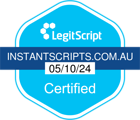Do you need treatment for blood pressure?
Manage your health from the comfort of home. Our Australian-registered doctors are available from anywhere in Australia.
Trusted by over 1 million patients
Australian-Registered Doctors
Highly Rated Customer Service
Australian Digital Health Agency registered
Blood pressure treatment options
Manage your health from the comfort of home
6am - midnight, 7 days a week
Available anywhere in Australia
eScript in minutes
Medication delivery
What is considered high blood pressure?
High blood pressure, also known as hypertension, is diagnosed when the blood pressure reading exceeds 140/90 millimeters of mercury (mmHg). This applies if either the systolic or diastolic number is higher than the respective thresholds.
Read more about blood pressure
Frequently
asked questions
Still need help? Chat to us.
What are the risk factors for high blood pressure?

Are there symptoms of high blood pressure?

How is high blood pressure diagnosed?

What are the treatments for high blood pressure?

What are the risk factors for high blood pressure?

Are there symptoms of high blood pressure?

How is high blood pressure diagnosed?

Show more
What are the treatments for high blood pressure?

Sources:
https://www.healthdirect.gov.au/high-blood-pressure-hypertension, Choosing Wisely Australia (The Royal Australian College of General Practitioners - recommendations), RACGP (Guidelines for preventive activities in general practice, 8th edition), National Heart Foundation of Australia (Guideline for the diagnosis and management of hypertension in adults), Heart Foundation (Blood pressure and your heart), National Diabetes Services Scheme (Blood pressure), High Blood Pressure Research Council of Australia (What is high blood pressure?)




